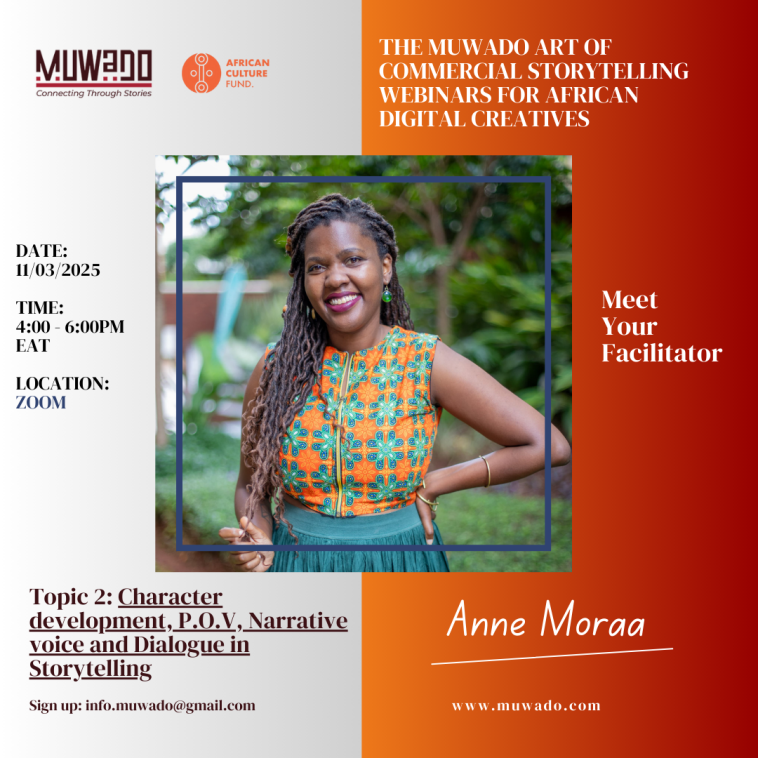Week 2 of the Muwado Commercial Storytelling Webinars happened on Tuesday 11th March with Anne Moraa – a Kenyan feminist writer, editor and occasional performer with a Masters degree in Creative Writing (University of Edinburgh) as our facilitator speaking on CHARACTER DEVELOPMENT, POV , NARRATIVE VOICE & DIALOGUE IN STORYTELLING.
Quick recap
Anne discussed various aspects of storytelling, including character development, point of view, narrative voice, and dialogue, emphasizing the importance of these elements in creating engaging stories. She also addressed the challenges of adapting a book into a screenplay or movie, the differences between film and television adaptations, and the importance of respecting the medium being adapted to. Lastly, Anne shared her insights on the writing and editing process, emphasizing the value of writing freely without self-editing initially and the importance of understanding different perspectives in storytelling.
Summary
Character Development in Storytelling
Anne began the session on character development, point of view, narrative voice, and dialogue in storytelling. She encourages open discussion and questions throughout the presentation. Anne explains that she will cover fundamental concepts that she frequently revisits in her own work, regardless of the medium. She emphasized the importance of character development, defining a character as someone who responds to events in a story, and how they change over the course of the narrative. Anne used the example of Neo from The Matrix to illustrate character development, showing how a character can transform from an ordinary person to a hero.
Character Development in Storytelling
Anne discussed character development in storytelling, focusing on three key elements: desire, need, and flaw. She explains that a character’s desire drives the plot, their need drives their intention and heart, and their flaw is what they must overcome to meet their needs or wants. Anne used examples from the movie Ocean’s 11 to illustrate these concepts. She also introduced the spectrum of flat to round characters, explaining that flat characters are one-dimensional and often used in folktales or action movies, while round characters are complex and nuanced, typically found in drama novels. Anne emphasized the importance of designing each character with their own desires, needs, and flaws, even in stories with multiple characters. She concluded by addressing questions about character archetypes and relatability, noting that characters don’t necessarily need to be relatable to be engaging.
POV and Narrative Voice in Storytelling
Anne discussed the importance of point of view (POV) and narrative voice in storytelling. She explained the three main POVs – first person, second person, and third person – and their strengths and challenges. Anne emphasized that the choice of POV should be based on what best serves the story. She also talked about narrative voice as the writer’s innate style and use of language, which can be improved through technique but is fundamentally unique to each author. Anne used examples from literature and TV adaptations to illustrate how different voices can tell the same story in distinct ways. She concluded by discussing dialogue, stressing that it should reflect the character’s voice rather than the author’s and should serve to advance the plot or reveal character.
Effective Dialogue Techniques in Storytelling
Anne discussed the importance of effective dialogue in storytelling. She emphasized that each line of dialogue should serve a purpose, either advancing the plot or developing characters. Anne advised reading dialogue aloud to ensure it sounds natural and realistic. She also recommended the “enter late, leave early” technique for scenes, which involves starting and ending scenes at key moments to maintain momentum and audience engagement. Anne addressed the differences in dialogue conventions for fiction, nonfiction, and reported writing, stressing the importance of consistency in fiction and accuracy in nonfiction and journalism. The session concluded with Anne offering to answer questions or provide exercises to practice the discussed techniques.
Adapting Books to Screen: Challenges and Success
In the meeting, Anne discussed the challenges of adapting a book into a screenplay or movie. She emphasized the importance of respecting the medium being adapted from and the medium being adapted to. Anne noted that different mediums have different strengths and limitations, and that an adaptation should not try to replicate the original work but rather enhance it. She gave examples of successful adaptations, such as the film version of American Psycho, which she felt was stronger than the book. Anne also touched on the differences between film and television adaptations, noting that TV series have more time to develop characters and world-building. She concluded by advising to respect the medium being adapted to and to focus on its unique strengths.
Writing Styles and Editing Techniques
Anne discussed several topics related to writing and editing. She advised that italicizing foreign words is not strictly necessary and depends on the author’s intent and audience. Regarding grammar rules, Anne emphasizes the importance of effective communication over strict adherence to rules, suggesting tools like Grammarly for those who want to check. She mentioned Octavia Butler as an example of an author whose editing process is visible, showing how technical skills can refine a unique style. Anne also discussed the concept of an “African voice” in writing, emphasizing that it’s made up of many individual voices and perspectives. Finally, she acknowledged the difficulty of self-editing and suggests that most writers struggle to objectively assess their own work.
Writing and Editing Process Tips
Anne discussed the writing and editing process, emphasizing the importance of writing freely without self-editing initially. She advised on taking breaks before editing, reading aloud, and finding trusted readers for feedback. Anne also shared her personal journey in commercializing storytelling, highlighting the value of telling original stories and persisting in one’s craft. She concluded by offering tips on maintaining the rhythm of a story while allowing for creativity, suggesting writers plot their stories first and then focus on individual sections to balance structure and poetic expression.
Next steps
• Participants to write their story from 4 different points of view: first person, second person, third person, and from the perspective of up to 3 different characters in the scene.
• Participants to post their writing exercises on the Muwado platform. (https://muwado.com/groups/the-muwado-art-of-commercial-storytelling-webinars/)
. Anne to provide feedback on the writing exercise entries sent by the Muwado Team.
• The Muwado Team to send the recording of last week’s session to new participants who request it.
• The Muwado Team to send details for next week’s session to all participants.
The next session is on Tuesday 18th March – PLOT, PACING & STRUCTURE IN STORYTELLING
With this session, we want the participants to come out clear about;
•Building a coherent and engaging plot.
•Traditional and modern narrative structures: three-act structure, nonlinear narratives, and fragmented storytelling.
•Experimenting with structure: flashbacks, multiple timelines, and parallel narratives.
Training Community Group On Muwado
To make the most of this training, it is better if you are a member of Muwado. If you are not yet, you can register here: https://muwado.com/register.
Once you have created an account and are logged in, you can start sharing your stories from here: https://muwado.com/create.
We have created a community group where we shall be discussing the lessons, posting assignments for feedback from our peers and working to ensure we are all learning together. When you are logged in, join the group from here, https://muwado.com/groups/the-muwado-art-of-commercial-storytelling-webinars/
We’ll be sharing additional features of the platform you can take advantage of over the course of the training. If you have any questions or challenges, you can reply to this email and we help you out.







